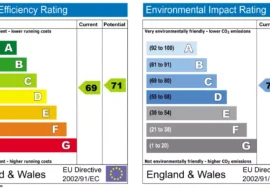
Why I need Energy Performance Certificate EPC?
What exactly is an EPC?
An EPC evaluates a property’s energy performance, with “A” indicating the most energy efficient property and “G” representing the least energy efficient property. It must be performed by a competent Domestic Energy Assessor and will also demonstrate the environmental effect of a building by noting its carbon dioxide emissions. The inspector considers things like wall, floor, and roof insulation, boiler efficiency, and even the type of light bulbs used. All EPCs are available on the national register.
Is an Energy Performance Certificate required?
When constructing a new building or marketing an existing structure for sale or rent, an Energy Performance Certificate (EPC) is required. An EPC allows you to think about energy efficiency as well as possible energy expenses.
Furthermore, as of April 1, 2018, any property rented on a new tenancy or a fixed term renewal must have an EPC rating of E or better. Because EPCs are only valid for ten years and became mandatory in 2008, it is critical to ensure that your EPC is still valid and has an E or above grade. Domestic properties with EPC ratings of F or G will be unable to be rented after April 1, 2020. Furthermore, if a landlord wishes to retake possession of a home rented under an Assured Short Hold Tenancy, he or she must first get a valid EPC before serving notice on a tenant.
What is at stake?
If you need an EPC, a qualified energy assessor will need to undertake an energy evaluation. The energy assessor will require access to all rooms including the loft. They must also evaluate heating systems and controls, take measurements, and photograph all critical data in the survey. The survey is non-invasive, and just a visual assessment is necessary. You might ask the assessor how long he expects to be there because the duration varies by property. Energy assessors can enter this data on-site or at home to create an Energy Performance Certificate, which is then submitted to the central registry.
EPCs are also required for buildings that have numerous tenancies and are rented for a variety of purposes, such as retail, office, and/or residential housing.
When an Energy Performance Certificate is not required
EPCs are not required for:
- lease extensions or renewals
- mandatory purchase orders
- sales of shares in a corporation where buildings stay in company control
- Lease surrenders temporary structures having a planned usage period of less than two years
- freestanding non-dwelling structures with a total useable floor area of less than 50 m2 industrial sites, workshops, and non-residential agricultural buildings with minimal energy consumption
EPC Deck providing EPC services all over United Kingdom. Book your EPC now



